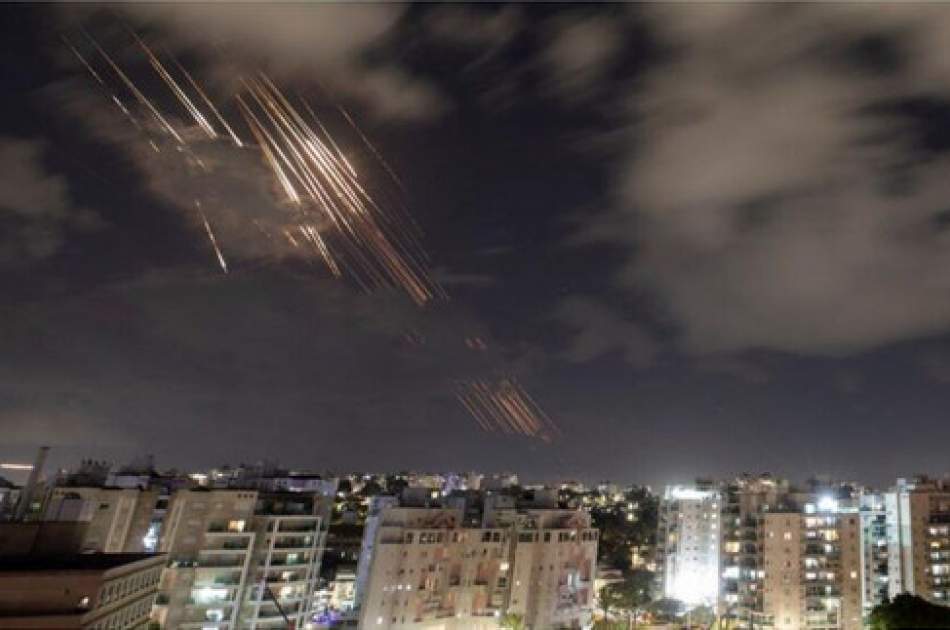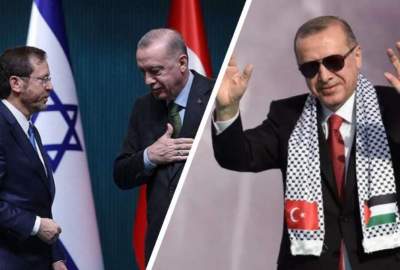The recent missile attacks of Lebanon's Hezbollah deep into the occupied territories using Fatih 110 missiles, after forty days of Seyed Hassan Nasrallah's martyrdom, indicate strategic and military changes in the region. These attacks were not only a military response to the aggression of the Zionist regime, but also send important psychological and strategic messages to Israel's domestic front and its supporters at the global level.
Publish dateSunday 10 November 2024 - 10:13
Story Code : 300333
Seyed Hamed Amini/ In the following, the dimensions of these attacks are examined from the perspective of military strength, psychological consequences and its impact on regional equations.
1. The military capabilities of the Fatih 110 missile and the challenges facing Israel's defense system
The Fateh 110 missile, one of Hezbollah's most advanced weapons with broad tactical and operational capabilities, can target key targets deep in the occupied territories due to its long range and high accuracy. This missile, which with its 500 kg warhead, destroys vital facilities such as refineries, power plants and large industrial centers in Israel, is considered a serious threat to Israel's national security.
Israel's defense systems, including the "Iron Dome" and "Flakhan Dawood", although effective in preventing some missile attacks, face limitations against precision-guided missiles such as the Fatih 110. The failure of these systems to prevent these missiles from hitting them challenges Israel's internal security and has affected public confidence in the defense capability of this regime.
2. Changes in the military equations of the region and strategic implications for Israel
Hezbollah's attacks on sensitive and symbolic centers of Israel, such as Tel Aviv, indicate an important change in the military and strategic equations of the region. The Zionist regime, which was always trying to reduce security threats by controlling Hezbollah's access to advanced weapons, is now faced with a real threat. These attacks show the weakness of Israel's strategies in curbing Hezbollah's military influence, and in addition to physical attacks, it has created a gap in the security and psychological state of Israeli society.
3. Psychological and social effects of rocket attacks on Israeli society
These attacks, especially with rockets hitting deep into Israel and sounding alarm bells, have had a deep psychological impact on the Israeli people. The residents of the occupied territories rush to the shelters every time they hear the sound of the sirens, and this collective fear and anxiety has eroded the morale and tolerance of the Israeli people. Losing confidence in security has weakened trust in defense systems and widespread dissatisfaction among citizens, and this situation can reduce the social cohesion of Israeli society over time.
In addition, the psychological pressures caused by constant threats have had an erosive effect on the daily lives of the Israeli people and have intensified their sense of insecurity. These attacks in a way show the failure of the psychological strategies of the Zionist regime to maintain peace on the domestic front, because Israelis now feel that they do not have complete security at any point.
4. The possible consequences of the use of more advanced weapons by Hezbollah
In the current situation, it is possible that Hezbollah will use more advanced weapons such as "Imad" missiles. These missiles, which have more accuracy and range than Fatih 110, are considered a more serious threat to Israel and can put more psychological and security pressure on Israel's internal front. The use of these weapons can bring great financial and political costs to the Israeli government and force the Zionist regime to reconsider its military strategies.
5. The role of anti-Israel thought and its institutionalization in the region
One of the key messages of these attacks is to strengthen and spread the idea of opposition to the Zionist regime in the region. Contrary to the imagination of Israel and its supporters, the assassination of leaders and suppression of opposition groups could not reduce the will and determination of young people in neighboring countries. These new generations, who grew up with anti-Israeli motivations and ideologies, today, with access to advanced military technologies and effective media tools, pose new threats to the Zionist regime.
This situation shows that even with the martyrdom of leaders like Seyed Hassan Nasrallah, the anti-Israel movements will continue more seriously in the region. In fact, the idea of anti-Israel has not only not disappeared, but has taken root as a strong and institutionalized ideology among the nations of the region and is getting stronger over time.
6. The necessity of the unity of the Islamic Ummah in supporting sustainability
Hezbollah's attacks show the fact that in the face of the aggression of the Zionist regime, the unity and solidarity of the Islamic Ummah is necessary. This alliance can be strengthened through political and financial support, boycotting Israeli products and asking Islamic countries to cut ties with Israel. In the current situation, Muslims have the duty to support stability and keep pace with achieving the rights of the Palestinian nation and the people of Lebanon.
Conclusion
Hezbollah's missile attacks using Fatih 110 missiles have created a significant change in the regional military equation and Israel's internal security. These attacks not only challenged Israel's defense systems, but also had a deep psychological impact on the domestic front. The message of these attacks, beyond the military dimension, is an emphasis on adherence to the idea of stability and the necessity of the unity of the Islamic Ummah against the aggression of the Zionist regime.
1. The military capabilities of the Fatih 110 missile and the challenges facing Israel's defense system
The Fateh 110 missile, one of Hezbollah's most advanced weapons with broad tactical and operational capabilities, can target key targets deep in the occupied territories due to its long range and high accuracy. This missile, which with its 500 kg warhead, destroys vital facilities such as refineries, power plants and large industrial centers in Israel, is considered a serious threat to Israel's national security.
Israel's defense systems, including the "Iron Dome" and "Flakhan Dawood", although effective in preventing some missile attacks, face limitations against precision-guided missiles such as the Fatih 110. The failure of these systems to prevent these missiles from hitting them challenges Israel's internal security and has affected public confidence in the defense capability of this regime.
2. Changes in the military equations of the region and strategic implications for Israel
Hezbollah's attacks on sensitive and symbolic centers of Israel, such as Tel Aviv, indicate an important change in the military and strategic equations of the region. The Zionist regime, which was always trying to reduce security threats by controlling Hezbollah's access to advanced weapons, is now faced with a real threat. These attacks show the weakness of Israel's strategies in curbing Hezbollah's military influence, and in addition to physical attacks, it has created a gap in the security and psychological state of Israeli society.
3. Psychological and social effects of rocket attacks on Israeli society
These attacks, especially with rockets hitting deep into Israel and sounding alarm bells, have had a deep psychological impact on the Israeli people. The residents of the occupied territories rush to the shelters every time they hear the sound of the sirens, and this collective fear and anxiety has eroded the morale and tolerance of the Israeli people. Losing confidence in security has weakened trust in defense systems and widespread dissatisfaction among citizens, and this situation can reduce the social cohesion of Israeli society over time.
In addition, the psychological pressures caused by constant threats have had an erosive effect on the daily lives of the Israeli people and have intensified their sense of insecurity. These attacks in a way show the failure of the psychological strategies of the Zionist regime to maintain peace on the domestic front, because Israelis now feel that they do not have complete security at any point.
4. The possible consequences of the use of more advanced weapons by Hezbollah
In the current situation, it is possible that Hezbollah will use more advanced weapons such as "Imad" missiles. These missiles, which have more accuracy and range than Fatih 110, are considered a more serious threat to Israel and can put more psychological and security pressure on Israel's internal front. The use of these weapons can bring great financial and political costs to the Israeli government and force the Zionist regime to reconsider its military strategies.
5. The role of anti-Israel thought and its institutionalization in the region
One of the key messages of these attacks is to strengthen and spread the idea of opposition to the Zionist regime in the region. Contrary to the imagination of Israel and its supporters, the assassination of leaders and suppression of opposition groups could not reduce the will and determination of young people in neighboring countries. These new generations, who grew up with anti-Israeli motivations and ideologies, today, with access to advanced military technologies and effective media tools, pose new threats to the Zionist regime.
This situation shows that even with the martyrdom of leaders like Seyed Hassan Nasrallah, the anti-Israel movements will continue more seriously in the region. In fact, the idea of anti-Israel has not only not disappeared, but has taken root as a strong and institutionalized ideology among the nations of the region and is getting stronger over time.
6. The necessity of the unity of the Islamic Ummah in supporting sustainability
Hezbollah's attacks show the fact that in the face of the aggression of the Zionist regime, the unity and solidarity of the Islamic Ummah is necessary. This alliance can be strengthened through political and financial support, boycotting Israeli products and asking Islamic countries to cut ties with Israel. In the current situation, Muslims have the duty to support stability and keep pace with achieving the rights of the Palestinian nation and the people of Lebanon.
Conclusion
Hezbollah's missile attacks using Fatih 110 missiles have created a significant change in the regional military equation and Israel's internal security. These attacks not only challenged Israel's defense systems, but also had a deep psychological impact on the domestic front. The message of these attacks, beyond the military dimension, is an emphasis on adherence to the idea of stability and the necessity of the unity of the Islamic Ummah against the aggression of the Zionist regime.
avapress.net/vdcbfgbffrhbgfp.4eur.html
Top hits







